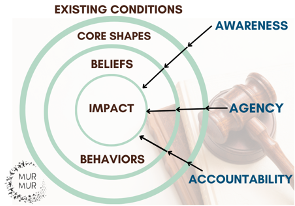Lindsey Frischer (she/they) is a lawyer and somatic coach working at the intersection of somatics and legal justice to help transform the legal profession to become embodied advocates in service of a more caring, equitable and just legal system. Lindsey is a partner at Murmur Collaborative delivering somatic coaching, consulting and facilitation across the legal industry to support the well-being of legal professionals, and runs her own coaching and consulting practice offering somatic coaching for lawyers and change-agents. Lindsey also practices as a pro bono attorney with Oasis Legal Services and the Immigration Justice Campaign representing the international LGTBQ+ community seeking asylum. She was a former corporate litigator at a Wall Street law firm in NY representing high-profile government investigations of global financial institutions during the height of the financial crisis.

